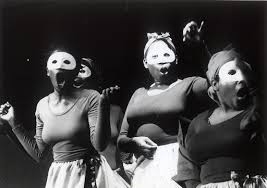Resurgence in America’s Roots Region: Towards A Cultural Foundation of Activism and Engagement

“If theatre means anything anywhere, it should certainly mean something here,” Dr. Doris Derby the night the Free Southern Theater (FST) was born.
Founded in 1963, the FST filled a vast cultural and activist void in the deepest Southern states. Dr. Derby, John O’Neal, and Gilbert Moses, organizers with the Student Nonviolent Coordinating Committee (SNCC), theorized that civic organizing necessitated an authentic cultural undergirding.
Their vision brought forth a theatre that was as unique to the Southern African-American experience as blues or jazz—a theatre for free thought, aesthetic beauty, and protest.
FST engaged with churches, developed a linguistic style that aimed to complement grassroots political action with rural culture, and—perhaps most importantly—committed to communities through creative dialogue.
“The Free Southern Theater was a tool, a creative tool, to teach the people that we performed for about what…they are expected to have as American citizens and were being denied in some way,” said FST actor Seret Scott who was interviewed by Michael Lueger for HowlRound’s Theatre History in 2017.
In the ’80s, the FST was reorganized into , a still-active and interrogative company in New Orleans named after a popular and populist, FST storytelling character, Junebug Jabbo Jones, who had been performed by O’Neal.
The New Orleans-based poet-educator-actor-activist Michael “Quess?” Moore, in his published on this site, credits the legacy of the FST, Junebug, and John O’Neal with introducing him to “an alternate world of sorts, where activism met acting” and inspiring his work.
But despite FST’s legacy of inspiring artists and their impact in subsequent iterations, they were struggling to survive as a theatre in an economically oppressed region.
In an interview from 1987 in the Tulane Drama Review, Thomas Dent, who took over as artistic director of FST in 1966, addressed the financial limits the FST faced at the time.
In addition to financial pressure, in ‘66 some of the FST actors and organizers had become philosophically disillusioned, as evidenced in Gilbert Moses’s , and a from Thomas Dent to the FST board of directors in which Dent calls out ongoing and longstanding conflict in the theatre.
Time for a New Southern Theatre
I went down [South] in January of 1969. I was a young, young person and just out of school…these young girls were standing there looking at me and talking to me, because to many of them I looked much the same as they did in terms of how old I was.
And they were talking to me about New York and about Washington, DC, which is where I'm originally from. …I mentioned I had been at the university in New York and that I had left to come down to work with the group and to work with people like them. And there was a silence and one young girl said, ‘You left a college to come down here and be with us to do this?’—Actor Seret Scott.